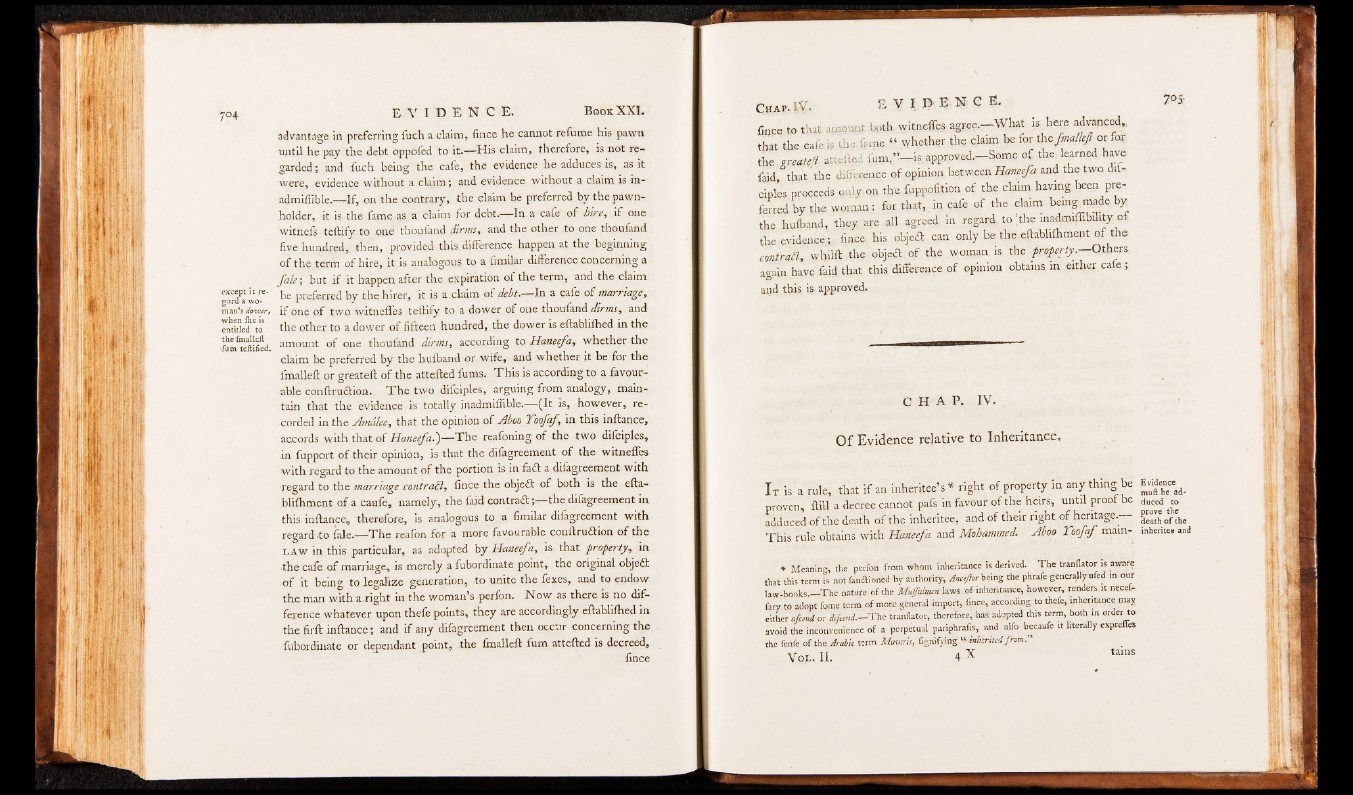
except it re gard
a woman’s
dower,
■ when fhe is
entitled to
the fmalleft
fum teftified.
advantage in preferring fuch a claim, fince he cannot refume his pawn
until he pay the debt oppofed to it.— His claim, therefore, is not regarded
; and fuch being the cafe, the evidence he adduces is, as it
were, evidence without a claim; and evidence without a claim is in-
admiflible.— If, on the contrary, the claim be preferred by the pawn-
holder, it is the fame as a claim for debt.— In a cafe of hire, if one
witnefs teftify to one thoufand dir ms, and the other to one thoufimd
five hundred, then, provided this difference happen at the beginning
of the term of hire, it is analogous to a fimilar difference concerning a
fa le ; but if it happen after the expiration of the term, and the claim
be preferred by the hirer, it is a claim of debt.— In a cafe of marriage,
if one of two witnefles teftify to a dower or one thoufand dtrtns, and
the other to a dower of fifteen hundred, the dower is eftablifhed in the
amount of one thoufand .dirms, according to Haneefa, whether the
claim be preferred by the hufband or wife, and whether it be for the
fmalleft or greateft of the attefted furas. This is according to a favourable
conftruaion. T h e two difciples, arguing from analogy, maintain
that the evidence is totally inadmiflible.— (It is, however, recorded
in the Amalee, that the opinion o f Aboo IToofcf, in this inftance,
accords with that of Haneefa.')— The reafoning of the two difciples,
in fupport of their opinion, is that the difagreement of the witneffes
with regard to the amount of the portion is in fa# a difagreement with
regard to the marriage contrail, fince the obje# of both is the efta-
blifhment of a caufe, namely, the faid .c o n t r a # th e difagreement in
this inftance, therefore, is analogous to a fimilar difagreement with
regard tto fale.— The reafon for a more favourable conftruftion of the
l a w in this particular, as adopted by Haneefa, is that property, in
the cafe of marriage, is merely a fubordinate point, the original obje#
of it being to legalize generation, to unite the fexes, and to endow
the man with a.right in the woman’s perfon. Now as there is no difference
whatever upon thefe points, they are accordingly eftablifhed in
the firft inftance; and if any difagreement then occur concerning the
fubordinate or dependant point, the fmalleft fum attefted is decreed,
fince
fu>ce to that amount both witneffes agree.— What is- here advanced,,
that the cafe is the fame | whether the. claim be for thefmalkji or for
the ereaUji attefted fum,”— is approved.— Some of the learned have
faid, that the difference of, opinion between Haneefa and the two dii-
ciples proceeds only, on the fuppofition of the claim having been preferred
by the woman: for that, in cafe of the claim being made by
the hulband, they are all agreed in regard to ;the inadmiffibility of
the evidence; fince his objeft can only be the eftablifhment of the
contrail, whilft the objcft of the woman is the property.— Others
again have faid that this'difference of opinion obtains in either caie ;
and this is approved.
C H A P . IV.
Of Evidence relative to Inheritance.
I t is a rule, that if an inherited * right of property in any thing be J g
proven, {till a decree cannot pafs in favour of the heirs, until proof be ducedjto
adduced of the death of the inheritee, and of their right of heritage. §eath 0f the
This rule obtains with Haneefa and Mohammd. Aboo Toofaf main- inherit« and
* Meaning, the perfon from whom inheritance is derived. T h e tranflator is aware
that this term is notfanftioned by authority, Anchor being the phrafe generally ufed in our
law-books.— T h e nature of the Muffulmcn laws o f inheritance, however, renders it necefr
fary to adopt fome term o f more general import, fince, according to thefe, inheritance may
either o /W o r ik/cmd.— T h e tranfiator, therefore, has adopted this term, both in order to
avoid the inconvenience of a perpetual pariphrafis, and alfo becaufe it literally exprefles
the fenfe o f the Arabic term Mawris, fignifying « inherited from."
VOL. II. 4 x tains